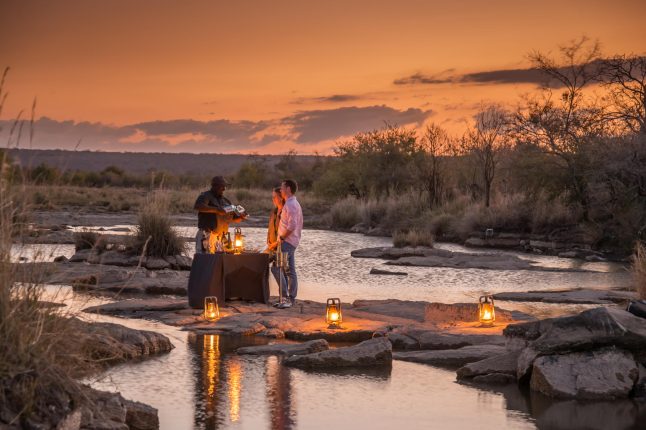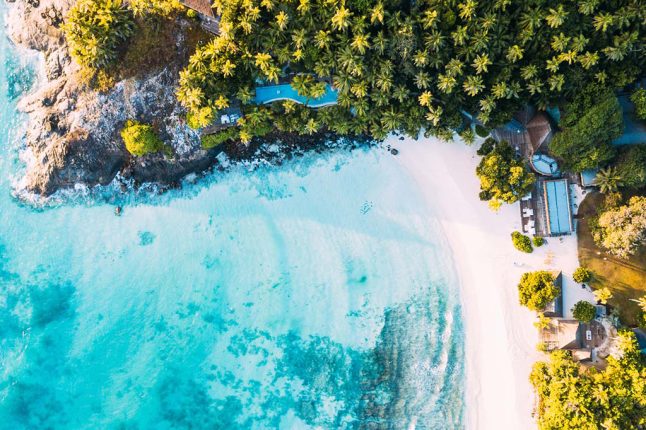Turning the Tide on Ocean-Bound Plastics
First Luxury Travel Company to Partner with Ocean Co.
How Your Journey is Helping to Save the Ocean
Traveling with Ubuntu Travel isn’t just about experiencing the wonders of Africa—it’s also about making a tangible difference in our planet’s health. With 22 million kilograms of plastic entering our oceans daily, the need for action is urgent. That’s why we’ve partnered with Ocean Co. to help collect 7 billion ocean-bound plastic bottles by 2025. For every traveler who embarks on safari with us, we commit to funding the collection of over 1,400 ocean-bound PET bottles, supporting livelihoods in coastal regions near Mombasa, Kenya. Together, we’re actively contributing to the protection of our oceans, one journey at a time.
Your Positive Impact on Ocean-Bound Plastic
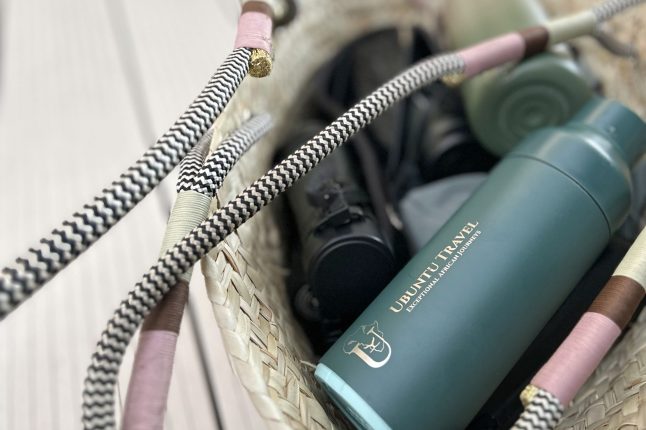
UBUNTU TRAVEL BOTTLES
Not only are our premium Ubuntu Travel water bottles and coffee flasks made from 64% recycled material, but they also represent 25 pounds (11.4kg) of ocean-bound plastic collected – equivalent to 1,000 plastic bottles.
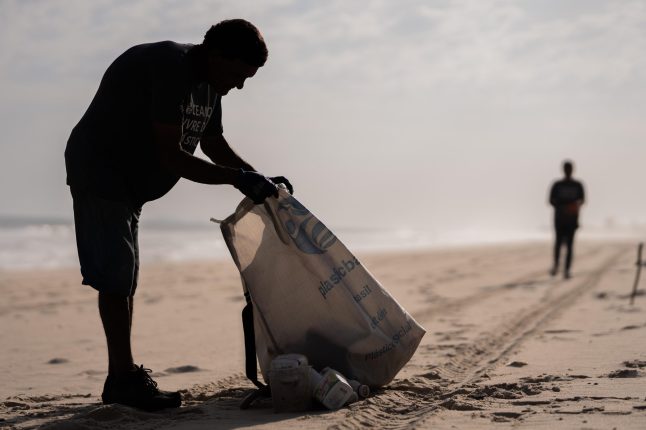
OCEAN-BOUND PLASTIC COLLECTED
To express our gratitude for choosing Ubuntu Travel, we pledge to fund the collection of an additional 1,400 PET bottles (35 pounds of plastic), ensuring responsible recycling or proper disposal to prevent environmental harm.
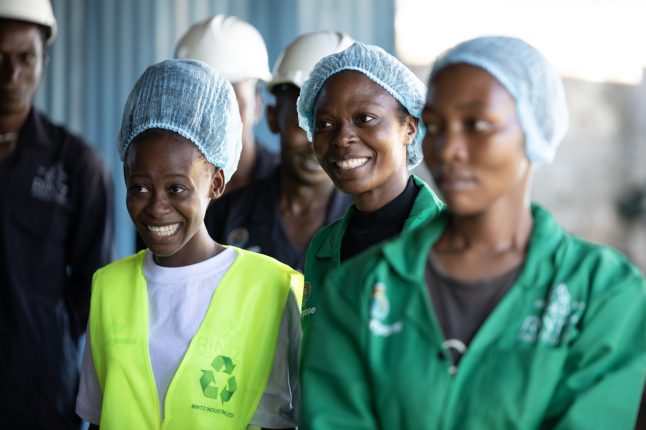
LOCAL COMMUNITY SUPPORT
Furthermore, by selecting to travel with us, you enable us to empower and support 158 workers at collection centers in and around Mombasa, Kenya. Our collaboration addresses the significant challenge of ethically processing single-use plastics.
Ubuntu Travel’s Collective Impact
Last Updated February 2025
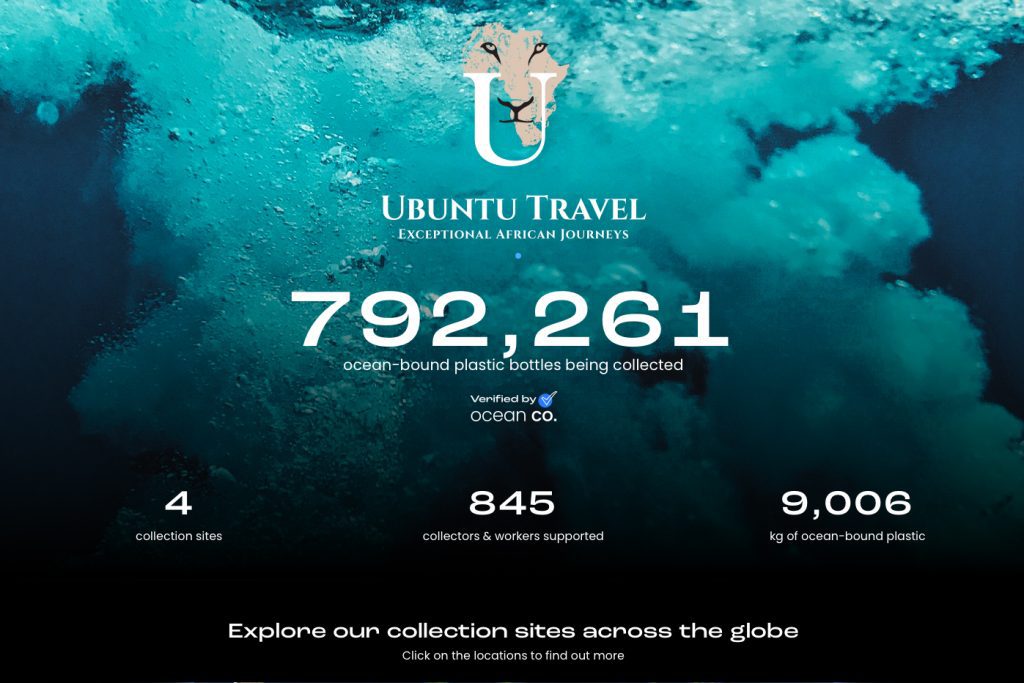
Luxury Big Five & Beach Safaris
Tanzania & Zanzibar
If you’re the type of traveler who can’t decide between safari and the sea, then you’ll be pleased to know you don’t have to! Just visit Tanzania. After experiencing an unforgettable safari in the Serengeti and a stay at the Ngorongoro Crater, make your way further east to exotic Zanzibar for marine wildlife adventures.
From $14,000 per person
Honeymoon Cape Town to Victoria Falls
Fancy a honeymoon in the most romantic locations around Southern Africa? We’ve got just the itinerary planned for you! Our Southern Africa Honeymoon itinerary will take you from Cape Town to Timbavati, onwards to Zimbabwe and finally finishing in whimsical Mozambique. Expect nothing but the best for this once in a lifetime trip.
From $105,000 per person
Simply The Seychelles
If your idea of a holiday is more sun and sand than safari, then the Seychelles archipelago of 115 islands might be just the spot for you! There are endless islands to explore and discover, however our highlights itinerary will give you a relaxing split of your time between two of the best islands to visit. Expect to be blown away both above land and under water!
From $15,950 per person
Frequently asked Questions from Ocean Co.
Plastic Pollution and Ocean Health
Plastic Pollution and Ocean Health: Ocean health is crucial for all ecosystems and living organisms, and plays a vital role in regulating Earth’s climate. It not only provides a habitat for our marine life, but supports the livelihoods of millions through fisheries, energy, tourism and more. Over half of our oxygen we breathe is produced by the oceans, making it essential to our existence. However, plastic pollution is a growing threat to ocean health – each year, millions of kg of plastic waste ends up in the oceans, causing a multitude of problems. Harmful chemicals can leach into the water, creating a toxic environment to plant and marine life. The presence of plastics can also enter the food chain, causing injury, disease and death to many species.
What is Ubuntu Travel doing to support the Ocean’s Health
At Ubuntu Travel, our collaboration with Ocean Co. is dedicated to preserving oceans by preventing plastic pollution. We pledge to procure 64% recycled water bottles and coffee flasks from Ocean Co., supporting the collection of ocean-bound plastic. Additionally, for every traveler who chooses a safari with us, we fund the collection of 35 pounds of ocean-bound plastic, aiding plastic collectors and centers in Mombasa, Kenya. Together, we’re making strides in ocean conservation and community support.
Plastic is a big problem for the environment, and it gets worse by mismanaged waste, illegal dumping and insufficient infrastructure. Ocean Co. pay for coastal communities to collect plastic that could end up in the ocean and waterways, and they set up facilities where locals can recycle it, especially in areas where there aren’t sufficient ways to get rid of plastic waste. Ocean Co. focus on places near the coast because a lot of the plastic that ends up in the ocean starts out there, and gets transported by river streams. And for the people who live near all this plastic, it makes life harder because it pollutes their water, air, and land. By paying locals to gather up the plastic, we stop it from floating around and breaking into microplastics that harm marine life. This helps keep the ocean cleaner and safer for everyone. With the help of our community, Ocean Co. has already kept over 12M kg of plastic out of the ocean, and we’re working hard to do even more.
What is Ocean-Bound Plastic?
We define ocean-bound plastic as material that is prone to enter waterways, and therefore we focus collection within 50km of waterways or coastal areas. Our partners collect almost every kind of plastic type, and ensure that it is given a useful second life. High value plastics are recycled, low value plastics are up-cycled, and hard to recycle plastics are co-processed.
Ocean Co.’s Impact
Plastic collection process: how is the plastic collected and what happens to the plastic
Ocean Co. operates within various coastal locations in Kenya, India, Indonesia, Brazil and Egypt. Some of these countries are listed in the top 10 most polluted oceans, however the paradox is that these countries do not consume the most plastic. Plastic waste ends up in their coastlines because of their high rainfall, geographical size, poor waste management systems, ocean currents, and imported waste from developed countries. The support from our Ocean Co. clients funds these coastal communities to collect plastic waste in exchange for money. They also gain access to social benefits such as healthcare, education and skills training, helping to steer waste collectors communities away from social marginalisation. We regularly update our stakeholders on the latest community projects that positively impact our collectors, and how their funding has been distributed. For some of our projects, we are able to fund the construction of material recycling facilities (MRF), which enable communities to recycle high-value plastics into everyday products, and down-cycle low-value plastics into longer-life materials. With the help of Ocean Co. clients, we fund the introduction of e-tricycles, and training, which allows collection workers to transport the plastic waste to our MRFs. Once the plastic is collected and recycled for a new purpose, our partners sell these products on to organisations across the globe.
Why does Ocean Co. collect ocean-bound plastic, rather than ocean plastic?
If your sink was overflowing, would you turn off the tap, or just start mopping the floor? Globally, our approach to plastic waste has been like the latter, meanwhile more plastic continues to flow into our seas. At Ocean Co. we want to turn off the tap by collecting plastic before it leaks into the water. We absolutely support the efforts of organisations who aim to retrieve plastic already leaked into our oceans, as together we can tackle the wider issue of plastic pollution and ocean health.
How does Ocean Co. ensure that plastic collectors receive a fair wage?
Ocean Co. has chosen three partners to work with based on a number of criteria, but namely their attention and efforts towards improving the livelihoods of collectors. These organisations do so by ensuring wages are regulated, all different types of plastic are collected, and workers can access social support, all of which are audited by leading third party certification bodies like WFTO, EcoVadis, and Verra. Ocean Co. also conduct on-going due diligence for all partners to ensure evidence is provided against criteria such as this, as well as working alongside our partners to support continuous improvement.






